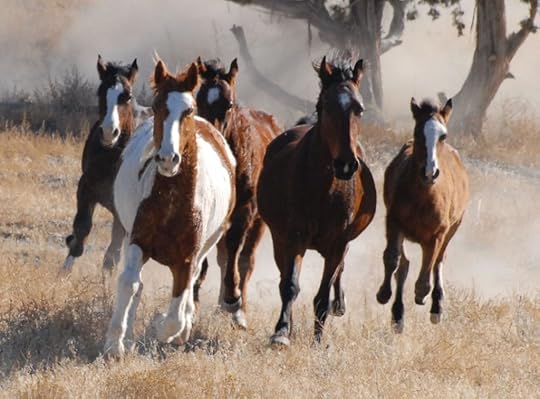Wild Horses a Problem for Ranchers? Wolves Could Fix That
 Today’s New York Times has a report on the wild horse population boom in the American West, and for once, I agree with the ranchers: Bizarre federal policies over the last 40 years have caused wild horses to run out of control, causing rampant overgrazing while also running up out-of-control costs (currently $50 million a year) to house horses that have been taken off the land, but can’t be euthanized.
Today’s New York Times has a report on the wild horse population boom in the American West, and for once, I agree with the ranchers: Bizarre federal policies over the last 40 years have caused wild horses to run out of control, causing rampant overgrazing while also running up out-of-control costs (currently $50 million a year) to house horses that have been taken off the land, but can’t be euthanized.
The federal policies are the result of misguided sentimental attitudes about a favored species, the same sort of attitudes that cause city people to feed feral cats in parks that would otherwise be havens for wildlife. If animal rights activists want to protect excess horses from being euthanized, or sold for meat, they should be picking up that $50 million cost of housing them, not taxpayers.
And here’s an idea for the ranchers: If you want to keep down the horse population, learn to tolerate wolves, grizzly bears, and other predators. They would act as a natural check on the horses. And, yes, you can have wolves and cattle, too, just get back to traditional ranching methods of protecting your herds.
If you’re not willing to do that on federal lands, nobody’s going to mind too much if the horses drive you out of business.
Here’s an excerpt from The Times:
On his ranch, Mr. Wintch drove up to a juniper-dotted hillside where a few years before, state wildlife workers had fenced in eight-foot squares with wire mesh to study the effect of grazing. In the protection of the squares, tawny tufts of Indian rice grass nodded in the breeze. Outside the squares, hard-packed dirt held a few vestiges of grass cropped down to nubs.
“This is all horses,” he said. “I haven’t put out cattle here at all this year.”
Last fall, the Bureau of Land Management sent a letter to Mr. Wintch and a dozen other ranchers in the region, saying that wild horses were increasing and that with no money for roundups, the ranchers should voluntarily cut their herds by half.
So this spring, Mr. Wintch sold a third of his cattle and let the rest out in his hayfields, where, he said, they will eat about $150,000 in winter hay.
“We can’t last out here if this continues,” Mr. Wintch said.
The Bureau of Land Management replied to the lawsuit by Mr. Wintch and the group of other local ranchers last week, denying it has violated federal law by failing to control horse populations.
“We don’t want to sue, but this is killing us financially,” said Tammy Pearson, who ranches near Mr. Wintch.
This summer, she kept her cattle out of the Bureau of Land Management pasture she leases because, she said, the horses had eaten the grass.
“It’s not a horse issue,” she said, looking across the pasture, where about 60 wild horses grazed. “It’s a range health issue. This land is getting beat up pretty good. Sure, it’s easy to blame the ranchers, but if you took us all off the land, you still wouldn’t solve the problem. The horses would just continue to expand. And then what?”





